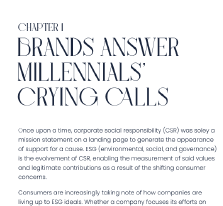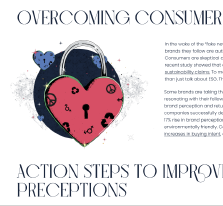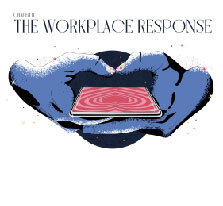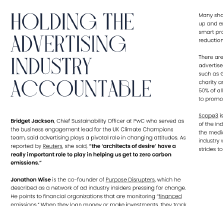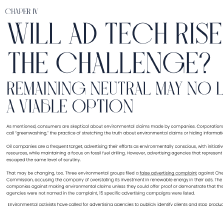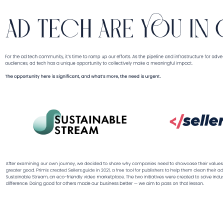CHAPTER IV
WILL AD TECH RISE TO THE CHALLENGE?
REMAINING NEUTRAL MAY NO LONGER BE A VIABLE OPTION
As mentioned, consumers are skeptical about environmental claims made by companies. Corporations are often called out for what critics call “greenwashing,” the practice of stretching the truth about environmental claims or hiding information that runs contrary to the narrative.
Oil companies are a frequent target, advertising their efforts as environmentally conscious, with initiatives such as investing in renewable resources, while maintaining a focus on fossil fuel drilling. However, advertising agencies that represent these conglomerates have largely escaped the same level of scrutiny.
That may be changing, too. Three environmental groups filed a false advertising complaint against Chevron with the US Federal Trade Commission, accusing the company of overstating its investment in renewable energy in their ads. The Commission had previously warned companies against making environmental claims unless they could offer proof or demonstrate that the impact is significant. While ad agencies were not named in the complaint, 15 specific advertising campaigns were listed.
Environmental activists have called for advertising agencies to publicly identify clients and stop producing ads for large oil companies. If agencies don’t change their approach to climate change, they may soon find themselves in the hot seat as well.
“These suits often focus on advertising and PR strategy, and risk drawing in agencies that work with them into the debate about liability,” says Clean Creatives, a group of self-acknowledged ad industry strategists, creatives, and leaders advocating for change.
SCIENTISTS JOIN THE CALL FOR ADVERTISING AGENCIES TO CHANGE
Clean Creatives is also working with the Union of Concerned Scientists, which recently drafted a letter signed by more than 450 scientists calling for a change in the advertising industry. The letter urges ad agencies to:
- Drop any clients that plan to expand oil and gas production.
- Refuse work from fossil fuel companies and trade groups that engage in climate deception.
- Cease all work that advocates against climate legislation.
- Focus on uplifting climate solutions that are already available.
“To put it simply,” the group said, “advertising and public relations campaigns for fossil fuels must stop.”
Clean Creatives is asking ad agencies and public relations firms to take a pledge to decline future contact with fossil fuel companies and trade associations. “We think that agencies that pride themselves on attracting the best talent and smartest clients should be taking this pledge because fossil fuel clients are an ongoing threat to their reputation and recruitment,” Duncan Meisel, Co-founder and campaign director for Clean Creatives told AdAge. “Maybe there's always someone who takes the industry's money — but it won't be the top agencies, and they will have diminished clout and reach as a result.”
So far, the response has received mixed reviews, PR firm Edelman announced it would part ways with clients that didn’t adhere to the company's ESG guidelines, and conduct a 60-day review of more than 330 clients. However, after the internal review was completed, the agency’s portfolio remained intact.
Edelman is just one marketing company receiving public scrutiny for their empty promises. In the days to come, expect more public pressure from environmental advocates and consumers to embrace sustainable practices and support ESG initiatives.
CHAPTER IV
WILL AD TECH RISE TO THE CHALLENGE?
REMAINING NEUTRAL MAY NO LONGER BE A VIABLE OPTION
As mentioned, consumers are skeptical about environmental claims made by companies. Corporations are often called out for what critics call “greenwashing,” the practice of stretching the truth about environmental claims or hiding information that runs contrary to the narrative.
Oil companies are a frequent target, advertising their efforts as environmentally conscious, with initiatives such as investing in renewable resources, while maintaining a focus on fossil fuel drilling. However, advertising agencies that represent these conglomerates have largely escaped the same level of scrutiny.
That may be changing, too. Three environmental groups filed a false advertising complaint against Chevron with the US Federal Trade Commission, accusing the company of overstating its investment in renewable energy in their ads. The Commission had previously warned companies against making environmental claims unless they could offer proof or demonstrate that the impact is significant. While ad agencies were not named in the complaint, 15 specific advertising campaigns were listed.
Environmental activists have called for advertising agencies to publicly identify clients and stop producing ads for large oil companies. If agencies don’t change their approach to climate change, they may soon find themselves in the hot seat as well.
“These suits often focus on advertising and PR strategy, and risk drawing in agencies that work with them into the debate about liability,” says Clean Creatives, a group of self-acknowledged ad industry strategists, creatives, and leaders advocating for change.
SCIENTISTS JOIN THE CALL FOR ADVERTISING AGENCIES TO CHANGE
Clean Creatives is also working with the Union of Concerned Scientists, which recently drafted a letter signed by more than 450 scientists calling for a change in the advertising industry. The letter urges ad agencies to:
- Drop any clients that plan to expand oil and gas production.
- Refuse work from fossil fuel companies and trade groups that engage in climate deception.
- Cease all work that advocates against climate legislation.
- Focus on uplifting climate solutions that are already available.
“To put it simply,” the group said, “advertising and public relations campaigns for fossil fuels must stop.”
Clean Creatives is asking ad agencies and public relations firms to take a pledge to decline future contact with fossil fuel companies and trade associations. “We think that agencies that pride themselves on attracting the best talent and smartest clients should be taking this pledge because fossil fuel clients are an ongoing threat to their reputation and recruitment,” Duncan Meisel, Co-founder and campaign director for Clean Creatives told AdAge. “Maybe there's always someone who takes the industry's money — but it won't be the top agencies, and they will have diminished clout and reach as a result.”
So far, the response has received mixed reviews, PR firm Edelman announced it would part ways with clients that didn’t adhere to the company's ESG guidelines, and conduct a 60-day review of more than 330 clients. However, after the internal review was completed, the agency’s portfolio remained intact.
Edelman is just one marketing company receiving public scrutiny for their empty promises. In the days to come, expect more public pressure from environmental advocates and consumers to embrace sustainable practices and support ESG initiatives.
.svg)
.svg)
.jpg)
